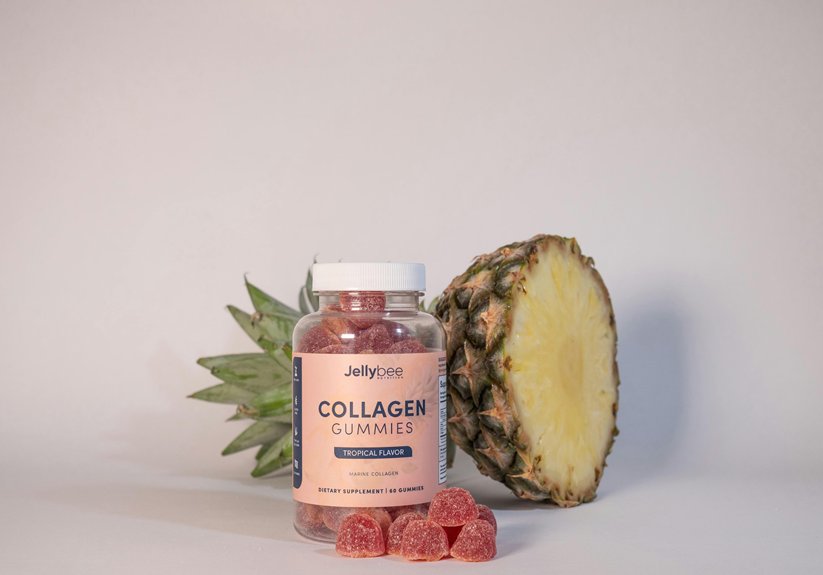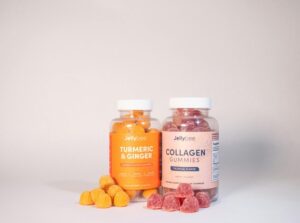
Collagen plays a crucial role in maintaining skin elasticity and joint health. Most of it comes from animal connective tissues, with bovine, marine, and chicken being the top sources for supplements. Each source offers unique benefits, but not all collagen is created equal. Understanding these differences can help you make informed choices for your health. So, what should you consider when selecting the right collagen supplement for your needs?
Understanding Collagen: What It Is and Its Importance
Collagen, a vital protein in your body, plays a key role in maintaining skin elasticity, joint health, and overall structural integrity. It’s the most abundant protein in your body, making up about 30% of your total protein content.
As you age, collagen production declines, leading to wrinkles, joint pain, and weakened tissues. Understanding collagen’s structure is crucial; it’s made up of amino acids, primarily glycine, proline, and hydroxyproline, which form a triple helix structure that provides strength and flexibility.
Diet, genetics, and lifestyle factors can influence collagen levels. By prioritizing collagen-rich foods or supplements, you can support your body’s natural production and help maintain a youthful appearance and robust joint function. Recent studies suggest that collagen loading can significantly enhance collagen levels, allowing for improved skin hydration and joint comfort.
Your choices today can impact your overall health tomorrow.
Animal Sources of Collagen
When it comes to boosting your collagen intake, animal sources are among the most effective options. Collagen is primarily derived from the connective tissues of animals, making sources like chicken, beef, and fish particularly rich in this protein.
Bone broth, made by simmering animal bones, extracts collagen and other nutrients, providing a potent supplement for your skin, joints, and overall health.
Additionally, collagen peptides, often sourced from fish or bovine hides, are easily absorbed and can enhance your body’s collagen levels.
Studies show that these animal-derived supplements can improve skin elasticity and hydration, as well as reduce joint pain.
If you’re looking to enhance your collagen intake, incorporating these animal sources into your diet or supplement routine can be highly beneficial.
Plant-Based Alternatives to Collagen
While animal sources provide effective collagen options, plant-based alternatives are gaining popularity for those seeking non-animal-derived solutions.
These options don’t contain collagen itself but can support your body’s natural collagen production. Key ingredients include vitamin C-rich foods like citrus fruits and bell peppers, which are essential for collagen synthesis.
Additionally, foods high in antioxidants, such as berries and leafy greens, help combat free radicals that can damage collagen. Certain plant-based proteins, like pea and rice protein, contain amino acids crucial for collagen formation.
You can also find supplements made from algae or specifically designed plant-based blends that promote skin health. Incorporating these foods and supplements can help you maintain healthy skin, hair, and joints without animal products.
Hydrolyzed Collagen: What You Need to Know
If you’re considering collagen supplements, hydrolyzed collagen might be your best option. This form of collagen is processed into smaller peptides, making it easier for your body to absorb.
Research shows that hydrolyzed collagen can improve skin elasticity, reduce wrinkles, and promote joint health. It’s often derived from animal sources like bovine or marine collagen, providing essential amino acids that support collagen synthesis in your body.
Many people prefer hydrolyzed collagen because it’s flavorless and can easily mix into various beverages or foods. Additionally, it generally has fewer side effects compared to other forms of collagen.
If you’re looking for a convenient way to enhance your collagen intake, hydrolyzed collagen is definitely worth considering.
Key Factors to Consider When Choosing Collagen Supplements
Choosing the right collagen supplement can be overwhelming, especially with the variety of options available on the market.
First, consider the source of collagen—sources like bovine, marine, and chicken each offer different benefits. Bovine collagen is rich in type I and III collagen, which supports skin and gut health, while marine collagen is often favored for its higher absorption rate.
Next, check for hydrolyzed collagen, which is broken down for easier digestion. Additionally, look for certifications like non-GMO or grass-fed to ensure quality.
Finally, pay attention to any added ingredients; some supplements include vitamins or minerals that may enhance collagen synthesis.
The Role of Vitamin C in Collagen Synthesis
When considering collagen supplements, it’s important to understand the role of vitamin C in collagen synthesis. This vital nutrient acts as a cofactor for enzymes involved in stabilizing and cross-linking collagen molecules, which is crucial for maintaining the structural integrity of your skin, bones, and connective tissues.
Without adequate vitamin C, your body can’t effectively produce collagen, leading to weakened tissues and potential skin issues. Studies show that vitamin C not only enhances collagen production but also protects against oxidative stress, further supporting skin health.
To maximize the benefits of your collagen supplements, ensure you’re also consuming sufficient vitamin C through foods like citrus fruits, berries, and leafy greens, or consider taking a vitamin C supplement alongside your collagen intake.
Integrating Collagen Into Your Daily Routine
Although incorporating collagen into your daily routine may seem daunting, it can be surprisingly simple and rewarding.
Start by choosing a high-quality collagen supplement—powder, capsules, or liquid form works best for you. You can easily mix collagen powder into your morning smoothie, coffee, or even oatmeal for a nutrient boost.
Consider taking it consistently at the same time each day to build a habit. Additionally, enhance collagen’s effectiveness by pairing it with vitamin C-rich foods like oranges or strawberries, which support collagen synthesis.
You might also explore collagen-rich foods, such as bone broth or skin-on poultry.






